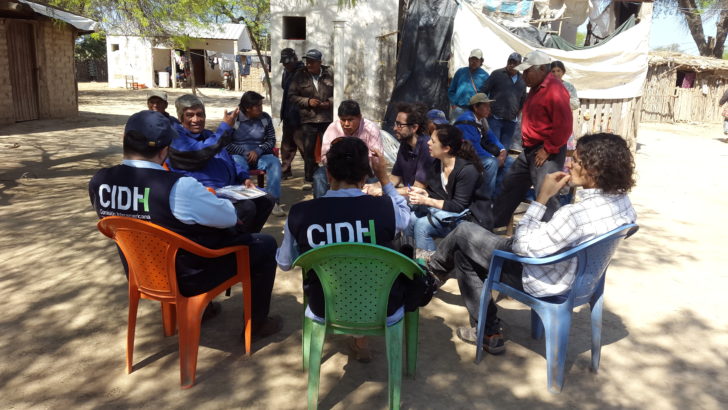This is the case of the Llaka Honhat Association of Aboriginal Communities from Salta province, which includes the communities of the Wichí (Mataco), Iyojwaja (Chorote), Nivacklé (Chulupí), Qom (Toba) and Tapy’y (Tapiete) peoples. Since 1984, the Llaka Honhat Association has demanded that the state guarantee the communities’ right to collective ownership of their ancestral lands, located in former state-owned lots 55 and 14 in the Rivadavia department of Salta province.
The indigenous communities demand that the state define and demarcate their territory, give them a sole property deed, and move the European-descended families (and their production facilities in particular) that have settled there, since the communities depend on the indigenous land for food, and for physical, social and cultural survival in general. Of the 643,000 hectares that make up lots 55 and 14, the state must demarcate 400,000 corresponding to the indigenous communities and 243,000 corresponding to the European-descended families with rights. Fences placed by non-indigenous peoples have disturbed the integrity of the original territory and the traditional way of life of the hunter-gatherer communities.
On August 4, 1998, the Llaka Honhat Association, represented by CELS and the Center for Justice and International Law (CEJIL), presented a petition before the Inter-American Commission on Human Rights (IACHR) regarding the violation of the obligations to respect, protect and adopt necessary measures to ensure the effective enjoyment of the right to communal property; the construction of several public works and the exploration of hydrocarbons in the traditionally indigenous territory without respecting inter-American standards on free, prior and informed consultation; and for having consented to and tolerated illegitimate actions by private individuals such as the installation of fences, logging and cattle farming in traditionally indigenous territory.
In 2012, the IACHR issued its Merits Report on the case in which it determined that various rights enshrined in the American Convention on Human Rights had been violated to the detriment of the communities grouped in the Llaka Honhat Association, and made recommendations to the Argentine state to guarantee the ancestral lands in question.
Despite intense work from the communities and the IACHR to get Argentina to enforce the rights at stake, and despite the fact that the state committed itself on several occasions (including by issuing specific regulations) to granting a deed that respects the traditional customs of the communities, six years after the IACHR’s merits report, the demarcation and delimitation of the indigenous land has not yet been completed. Also, not even 5 percent of the infrastructure works necessary for the European-descended families to relocate have been carried out; no effective measure to combat illegal logging has been taken, nor has any progress been made to remove fences in the indigenous territory, among other actions that are still pending.
This situation exposes the vulnerability of indigenous peoples’ land rights and the danger that failing to achieve a timely resolution poses to their traditional ways of life. For that reason, the Inter-American Commission ultimately decided to send the case to the Inter-American Court, where these indigenous communities will continue fighting for respect and protection of their human rights.

